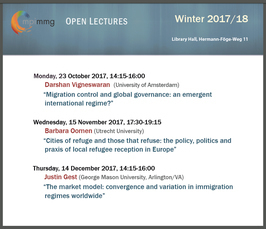"Homo itinerans: an essay towards a global ethnography of Afghanistan"
Open Lectures Winter 2017/18
- Date: Jan 18, 2018
- Time: 02:15 PM - 04:00 PM (Local Time Germany)
- Speaker: Alessandro Monsutti (Graduate Institute Geneva)
- Alessandro Monsutti is Head of Anthropology and Sociology at the Graduate Institute Geneva. Trained as a social anthropologist, Alessandro Monsutti became a member of the faculty in 2010, after having taught at the Graduate Institute of Development Studies from 2003 to 2007. He has been Research Fellow at the School of Oriental and African Studies (1999-2000) and Yale University (2008-2010), Grantee of the MacArthur Foundation (2004-2006), and Visiting Professor at the University of Vienna (2012) and Arizona State University (2014). He is also Research Associate at the Refugee Studies Centre (University of Oxford). In addition, he has worked as a consultant for several international and nongovernmental organisations such as UNHCR. Among his current research interests: the political economy of reconstruction in Afghanistan as an example of emerging forms of sovereignty and global governance; asylum seekers and refugees in Europe; migrants and non-migrants in urban neighbourhoods; the changing nature of borderlands in Europe and South Asia.
- Location: MPI-MMG, Hermann-Föge-Weg 11, Göttingen
- Room: Library Hall

For more details please contact buethe(at)mmg.mpg.de.
In its scale and duration, the 40-year old series of conflicts that has been tearing Afghanistan apart has caused one of the most serious humanitarian disasters since World War II and one of the most massive displacements of population in the last decades. Afghans, by millions, live and circulate outside their country of origin and have been increasingly arriving to Western Europe, but also North America and Australia. Conversely, Afghanistan is the destination of thousands of experts who conceive their endeavor within the framework of a struggle between the values of modernity (democracy, human rights, women’s empowerment, secular education, and accountability, to mention but a few), the archaisms of tradition, and the corruption of the state system. How can such multifaceted dynamics be grasped ethnographically? How can we make sense of the various forms of mobility woven around and beyond the Afghan territory? Ultimately, can the country be considered a global arena allowing us to highlight transversal social and political processes observable in other parts of the world?